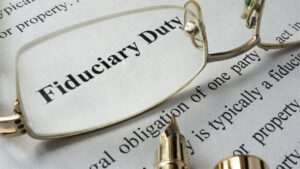
At the Law Office of Andrew M. Lamkin, P.C., we understand how damaging a breach of trust can be. In the contexts of estate planning, estate administration, and residential real estate, professional relationships are often built on a foundation of trust and accountability. Thankfully, the law imposes specific standards on many professionals who work in these industries. These standards, called fiduciary duties, can be used to impose consequences on professionals who break that trust. When engaging with these industries, it is essential to understand who can be held liable for a breach of fiduciary duty. That is the topic of our discussion today.
What Is a Fiduciary Duty?
Certain relationships are built on a foundation of trust. Take, for example, the relationship between a lawyer and their client. The lawyer possesses knowledge and expertise the client is unlikely to have direct access to. This creates a power imbalance in which the client has no choice but to trust that the lawyer is working in their best interest. Due to the imbalance, the law requires that the lawyer lives up to specific standards regarding their business with the client. The law refers to these standards as fiduciary duties.
In short, a fiduciary duty is a strict requirement imposed on a person in a position of trust to act in the best interests of their clients. These duties are legally enforceable, and a fiduciary is liable for the damage caused if they breach that duty.
What Is a Fiduciary Relationship?
Fiduciary duties can arise from a broad range of relationships. The person owed the fiduciary duty is known as the principal or beneficiary. The person with the fiduciary duty is called the fiduciary.
There are two circumstances under which fiduciary relationships arise. First, fiduciary relationships can be created through laws and contracts. Each of these relationships is defined explicitly by statute. These fiduciary relationships are the most common and can be straightforward to prove. Trustees are an example of a fiduciary defined by New York law.
Second, New York courts can find a fiduciary relationship exists based on the circumstances of the relationship and the transactions within which the parties are engaged. This second type of fiduciary relationship is less common and often more challenging to prove.
People commonly considered to be fiduciaries under New York law include:
- Attorneys,
- Investment advisors,
- Bankers,
- Real estate agents,
- Business partners,
- Corporate officers,
- Corporate directors,
- Controlling shareholders,
- Guardians,
- Doctors,
- Trustees, and
- Personal representatives.
If you have questions concerning whether a fiduciary relationship exists in your circumstances, an experienced attorney from the Law Office of Andrew M. Lamkin, P.C. can help.
Types of Fiduciary Duties
Fiduciaries owe several duties to their clients. The three primary duties that fiduciaries owe are a duty of care, a duty of loyalty, and a duty of candor. Under certain circumstances, other duties can arise. For example, in a corporate setting, a duty to act lawfully becomes explicit and warrants its own category. A breach of one or more of these duties can make a fiduciary liable to their principal.
Duty of Care
The duty of care imposes a responsibility on a fiduciary to act in a manner consistent with that of a reasonable and prudent person under similar circumstances. This standard can be more or less stringent depending on the type of fiduciary relationship. For example, the duty of care imposed on a medical doctor differs from that imposed on an attorney. The courts will judge the actions of each fiduciary in the context of the applicable relationship.
Duty of Loyalty
The duty of loyalty requires that fiduciaries act in the best interests of their principals at all times. The fiduciary must put the interests of their beneficiary ahead of their own interests and even the interests of others. This duty also requires that fiduciaries avoid conflicts of interest and inform their beneficiaries whenever a conflict arises.
Duty of Candor
The duty of candor demands that fiduciaries act openly and honestly in their dealings with their principal. A fiduciary must keep the beneficiary informed of all relevant information. They also must act truthfully throughout the fiduciary relationship.
Duty to Act Lawfully
Some people consider the duty to act lawfully to arise from the duty of loyalty. However, the duty to act lawfully is more explicit under certain circumstances. For example, a corporate director or officer has a duty that restricts them from causing the corporation to engage in illegal activities. They are also required to act lawfully.
The business judgment rule protects corporate fiduciaries from being held liable for legitimate business decisions made in good faith. Fiduciaries who breach the duty to act lawfully often lose the added protection of the business judgment rule. A fiduciary who loses the benefit of this rule is more susceptible to being sued by the principal.
What Constitutes a Breach of Fiduciary Duty?
Proving a breach of fiduciary duty can differ based on the fiduciary relationship involved. Under most circumstances, the plaintiff must prove the following:
- The existence of a fiduciary relationship,
- That the defendant breached a fiduciary duty, and
- The plaintiff suffered direct harm as a result of the breach.
Depending on the relationship, the plaintiff might also need to overcome added hurdles. The business judgment rule is one of those hurdles in a corporate setting.
Given the complicated nature of proving a breach of fiduciary duty, consulting with an attorney is your best option. Andrew M. Lamkin and his team have extensive experience evaluating fiduciary duties as they relate to most areas of law. If you have questions concerning fiduciary duties in these contexts, contact us today to schedule a consultation.
Remedies for Breach of Fiduciary Duty Claims
The remedies available to a plaintiff who sues for a breach of fiduciary duty are linked to the damage the plaintiff suffered. In some situations, the plaintiff can recover damages from the fiduciary. Common damages that courts award in such cases include the following:
- Lost profits,
- Economic damages,
- Equitable relief,
- Recovery of profits made by the fiduciary,
- Damages for mental anguish, and
- Monetary damages.
In some instances, plaintiffs can also recover punitive damages. Punitive damages are meant to punish the fiduciary for egregious acts, omissions, or misconduct.
Courts can also impose professional consequences on individuals who breach their fiduciary duties. A serious breach of fiduciary duty can lead to the disbarment of a lawyer from practicing law, for example. These consequences severely affect a professional’s ability to work and will prevent them from causing further harm.
Andrew M. Lamkin Can Help
If you believe that you have a breach of fiduciary duty case, please contact us. We welcome you to discuss your case and concerns with us so we can determine if a breach has occurred and what your likely remedies are. We are skilled, compassionate lawyers who know how to be aggressive if and when the need arises.


